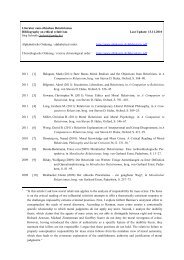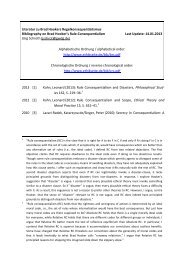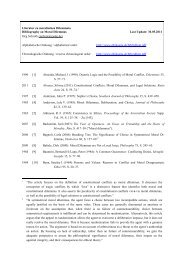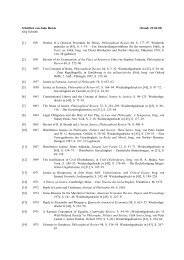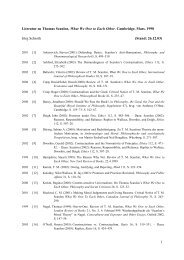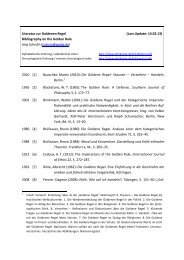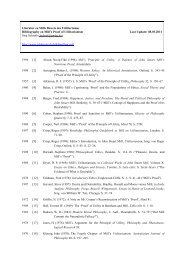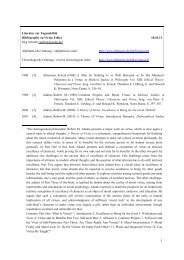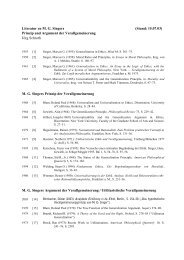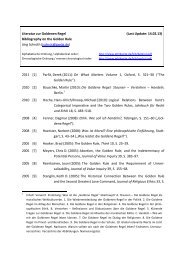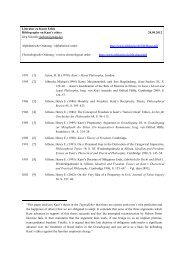Chronologische - Ethikseite
Chronologische - Ethikseite
Chronologische - Ethikseite
You also want an ePaper? Increase the reach of your titles
YUMPU automatically turns print PDFs into web optimized ePapers that Google loves.
S. 417–44. 102<br />
2006 [354] Mahon, James Edwin (2006): Kant and the Perfect Duty to Others Not to Lie, British Journal<br />
for the History of Philosophy 14, S. 653–85.<br />
2006 [355] Martin, Adrienne M. (2006): How to Argue for the Value of Humanity, Pacific Philosophical<br />
Quarterly 87, S. 96–125. 103<br />
2006 [356] Mayer, Verena (2006): Das Paradox des Regelfolgens in Kants Moralphilosophie, Kant-<br />
Studien 97, S. 343–68. 104<br />
2006 [357] Mieth, Corinna/Rosenthal, Jacob (2006): “Freedom must be presupposed as a property of the<br />
will of all rational beings” (GMS III, 2), in Groundwork for the Metaphysics of<br />
Morals, hrsg. von Christoph Horn und Dieter Schönecker, Berlin, S. 247–84.<br />
2006 [358] Moore, A. W. (2006): Maxims and Thick Ethical Concepts, Ratio 19, S. 129–47. 105<br />
102 “This article argues for a distinction between reticence and lying on the basis of what Kant says about<br />
reticence in his correspondence with Maria von Herbert and in his other ethical writings, and defends this<br />
distinction against the objections of Rae Langton (‘Duty and Desolation’, Philosophy 67, No. 262 (October<br />
1992), 481–505). Lying is necessarily deceptive, whereas reticence is not necessarily deceptive. Allowing<br />
another person to remain ignorant of some matter is a form of reticence that is not deceptive. This form of<br />
reticence may be ethically permissible.”<br />
103 “Significant effort has been devoted to locating a good argument for Kant’s Formula of Humanity. In this<br />
paper, I contrast two arguments, based on Kant’s text, for the Formula of Humanity. The first, which I call<br />
the ‘Valued Ends’ argument, is an influential and appealing argument developed most notably by Christine<br />
Korsgaard and Allen Wood. Notwithstanding the appeal and influence of this argument, it ultimately fails<br />
on several counts. I therefore present as an alternative the ‘Autonomy’ argument, which is largely inspired<br />
by the failings of the Valued Ends argument.”<br />
104 „Regeln im Sinne von Handlungsvorschriften setzen ihre Anwendbarkeit schon begrifflich voraus. Alle Regeln<br />
regeln mögliches Verhalten, seien es Verkehrsregeln, juridische Gesetze, mathematische und logische<br />
Verfahren, und selbst „Bedeutungspostulate“, die festlegen, wie ein Ausdruck verständlich zu verwenden<br />
ist. Regeln ohne irgendeinen möglichen Anwendungsspielraum sind sinnlos. Dabei werden durch Regeln<br />
nicht nur mögliche Anwendungen präsupponiert, sondern umgekehrt aus gegebenen Tatsachen oder<br />
Ereignissen Regelmäßigkeiten herausgelesen, die sich in der Regel ausdrücken. Die Regel bezeichnet in<br />
diesem Sinne das „Prinzip hinter den Tatsachen“, das sie diesen freilich in gewisser Weise erst andichtet.<br />
Zweck dieses Vorgehens ist nicht zuletzt, die mögliche Fortsetzung der Tatsachenreihe gleichzeitig zu<br />
bestimmen und zu begründen, jedenfalls aber eine gewisse Ordnung, Rechtfertigung und Voraussagbarkeit<br />
des Handelns zu gewährleisten. Regelanwendung verlangt deshalb eine komplexe geistige Kompetenz, die<br />
nicht nur Fähigkeiten der Abstraktion und Reflexion, sondern auch Können und Erfahrung voraussetzt.“<br />
105 “I begin with Kant’s notion of a maxim and consider the role which this notion plays in Kant’s<br />
formulations of the fundamental categorical imperative. This raises the question of what a maxim is, and<br />
why there is not the same requirement for resolutions of other kinds to be universalizable. Drawing on<br />
Bernard Williams’ notion of a thick ethical concept, I proffer an answer to this question which is intended<br />
neither in a spirit of simple exegesis nor as a straightforward exercise in moral philosophy but as something<br />
that is poised somewhere between the two. My aim is to provide a kind of rational reconstruction of Kant. In<br />
the final section of the essay, I argue that this reconstruction, while it manages to salvage something<br />
distinctively Kantian, also does justice to the relativism involved in what J. L. Mackie calls ‘people's<br />
adherence to and participation in different ways of life’.”



